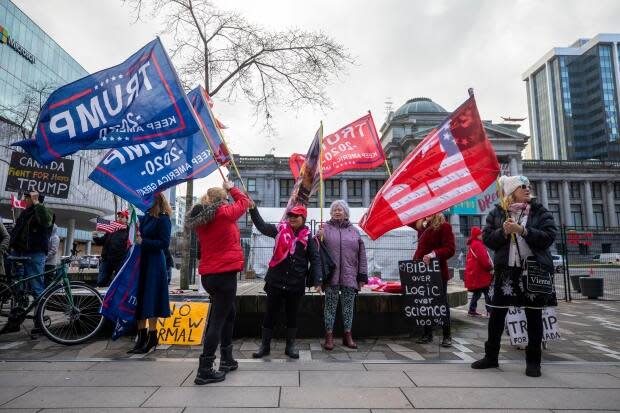Pro-Trump protests turn violent on West Coast after riots lock down U.S. Capitol
Thousands of kilometres away from Washington D.C., where rioters stormed the U.S. Capitol, smaller-scale protests materialized on the West Coast, both in Washington state and in Vancouver, B.C.
They came shortly after supporters of U.S. President Donald Trump forced themselves past barricades and into the Capitol building, where lawmakers were set to formally approve president-elect Joe Biden's win in the general election.
Politicians barricaded themselves in offices as people smashed windows and climbed into the building and overtook police in the rotunda. One woman was shot inside the Capitol building during the clashes and later died in hospital.
CBC News photographer punched
The tension spread to the West Coast, to Olympia, Wash., where hundreds of protesters made it through the gates of the governor's mansion as police ordered them to disperse, and to B.C. where a much smaller protest in front of the Vancouver Art Gallery turned violent when a man wearing a black jacket, pants and a mask assaulted CBC News staff photographer Ben Nelms.

Nelms was taking photos, when one of the protesters charged him and punched him in the face, he said.
"He was upset that I, along with other members of the media, were taking pictures and reporting the event," Nelms said.
"Physical violence against members of the media is wrong and doesn't just happen outside of Canada, but here in Vancouver."
Nelms was not seriously injured.
In video footage from the event, some protesters holding Trump flags and posters can be seen trying to get in between the man and several photographers at the scene.

In a statement, the Vancouver Police Department said the suspect took off before police arrived. They continue to investigate.
At the U.S. Capitol, scenes emerged of protesters stomping on camera equipment abandoned by news media.
CBC News senior correspondent Katie Nicholson was also verbally accosted while reporting from the streets of Washington on live television.
Premier John Horgan denounces violence
The stunning scenes of violence and disorder drew attention and condemnation internationally, including from leaders in Canada who viewed the day's events as an assault on democracy.
In a tweet, Prime Minister Justin Trudeau said Canadians are "deeply disturbed and saddened by the attack on democracy" happening in the U.S.
"Violence will never succeed in overruling the will of the people. Democracy in the U.S. must be upheld — and it will be," he said.
B.C. Premier John Horgan tweeted he was "shocked" to see the violence south of the border.
"Intimidation cannot be permitted to disrupt democratic institutions. This violent disorder should be denounced by all those who believe in democracy," he said.
The protests began shortly after Trump addressed thousands of his supporters on Wednesday at a rally near the White House, repeating his baseless claims of election fraud, as lawmakers were preparing to receive the votes for president from the electoral college.
"We will not let them silence your voices," Trump told the protesters, who had lined up before sunrise to get a prime position to hear the president.
After the Capitol was first breached, Trump encouraged supporters in a tweet to "remain peaceful," but didn't immediately call on them to disperse. He later told protesters to "go home now" in an inflammatory video released on Twitter, later deleted by the social media company, that also decried the theft of the election.
The government resumed counting electoral votes later Wednesday evening after officials were able to secure the Capitol.


